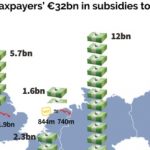Donald Trump has always backed oil and gas, and U.S. industry giants donated $7.3m to his campaign, three times more than for his 2020 run. Joe Biden has introduced green energy policies and other transition legislation, though he has also overseen an increase in domestic oil production and promised motorists he will keep petrol prices low. Both candidates know that U.S. voters are particularly sensitive to the price of their gasoline, in a land … [Read more...]
UCO (Used Cooking Oil) for biofuels: how much is fraudulently imported virgin vegetable oil?
UCO (Used Cooking Oil) is a feedstock for biofuels. In 2023, European countries consumed close to seven million tonnes of UCO for biofuels. This is four times the continent’s maximum potential for supplying it domestically, so the rest comes from imports, mostly from China, Malaysia and Indonesia. The vast majority is blended for biodiesel to use in cars and trucks. UCO accounted for one third of conventional biodiesel feedstocks and a quarter of … [Read more...]
EU Elections 2024: the Green Deal is being sidelined. What can be done?
In the run-up to the EU elections this June, Andrea Renda at CEPS, writing for IDDRI, says the Green Deal is being ousted from the public debate. Protests against important elements of the Green Deal – including environmental regulations, wind and solar farm installations, a ban on combustion engines – are being used by populists to scare mainstream politicians away from openly championing Europe’s green and clean energy ambitions. Proponents of … [Read more...]
Roadmap to reduce EU car fleet emissions 86% by 2040
T&E has just published its car decarbonisation roadmap. It shows that the EU’s car CO2 standards, including the phase-out of combustion car sales in 2035, is the single most important emission reduction measure. But if the EU is to hit its newly proposed 2040 climate target - a 90% CO₂ reduction across the European economy by 2040 - it will need to deal with a significant amount of ICE (internal combustion engine) cars already on the road. … [Read more...]
Electrostatic Generator fabrics can capture energy from cars depressing roads, swaying buildings + more
Literally anything that moves is using energy that can be harnessed. Not just waves rolling toward shore but cars depressing roads, buildings swaying in the wind, and much more. One way to harness it is to create a material that can be woven into the fabric of roads and buildings so that it captures the energy and converts it into electricity. Caitlin McDermott-Murphy at NREL describes research into Hexagonal Distributed Embedded Energy … [Read more...]
How practical is an E-bike compared to a Car: time, cost, energy
As e-bikes proliferate in cities around the world, there is a growing need to measure how practical an e-bike is compared to a car, and why. Julia Thomas at NREL describes research there that evaluates usefulness using the Mobility Energy Productivity (MEP) metric. The MEP quantifies the ability of an area's transportation infrastructure — given any specific travel mode — to connect individuals to goods, services, employment opportunities, and … [Read more...]
Formula 1’s energy efficiency innovations for road transport are being wasted
Formula 1 racing is infamously emissions intensive. But the pressure to win is a pressure to innovate and raise energy efficiency, supported by an extravagant budget. Maximilian Auffhammer at the Energy Institute at Haas looks at what has been achieved over decades, and what has – and has sadly not – been translated onto our roads. The earliest cars had 4.5L engines that produced 400 horsepower, refuelled during the race. Today’s cars have 1.6L … [Read more...]
EU: no CO2-emitting car sales from 2035. But beware of the small exemption for e-fuels
At the end of March, EU countries gave final approval to end sales of new CO2-emitting cars in 2035. It came after Germany argued for and won an exemption for cars running on e-fuels. William Todts at T&E celebrates the landmark decision, but warns that this lifeline for e-fuels will be used by its supporters and the oil lobby to obstruct the rapid transition to EVs. He quotes T&E research that shows e-fuels are far less efficient than … [Read more...]
Will the computing power needed for self-driving cars create a carbon emissions problem akin to data centres?
Few predicted, in their early days, that the scale-up of data centres would result in them having a measurable impact on global energy consumption. Today they contribute 0.3% of global emissions. That’s a big enough number to put it on the global radar and for the IEA to be monitoring it. Will the wide scale take-up of autonomous vehicles have the same effect? Yes, explains Adam Zewe at MIT who describes new research from there. In summary, one … [Read more...]
How European nations are using tax to promote zero-emissions cars
Taxation is an effective way to steer people towards zero-emission cars. But there is wide variation between European countries in how this is done, and therefore the results. Griffin Carpenter at Transport & Environment (T&E) summarises their report “The good tax guide: A comparison of car taxation in Europe” that covers seven forms of car taxation across 31 European countries in detail. The ultimate goal should be to create a clear … [Read more...]
New research ranks the 12 best ways to cut car use in cities
Behaviour change is as an important part of our transition journey as the clean energy revolution. Kimberly Nicholas at Lund University summarises research that has gathered together nearly 800 peer-reviewed reports and case studies from across Europe that analyse ways of reducing car use. One main challenge is to quantify the benefits so policy-makers and citizens can make evidence-based decisions on how to re-imagine city mobility. Nicholas … [Read more...]
E-fuels for cars are expensive, and pollute the air as much as petrol
MEPs and governments are currently deciding on an EC proposal for all new cars sold from 2035 to be 100% zero-emissions. Here, T&E present test results that show e-fuels should not be allowed to replace petrol. T&E are concerned that e-fuels are being promoted as a way to prolong the life of ICE vehicles. But their tests show that e-fuels produce just as much NOx, three times more carbon monoxide, and twice as much ammonia. Though e-fuels … [Read more...]
Giving car manufacturers e-fuel credits will slow the rise of EVs
Transport & Environment (T&E) explains why e-fuel credits should not be included in the EU’s CO2 standards for new cars. If they are, it would give carmakers the option to claim an ICE vehicle as low- or zero-emission. But carmakers have no control over what fuel their customers put in their cars, making the regulation impossible to monitor. That opens the door to double-counting emission reductions with other existing regulations (Fuel … [Read more...]
Aviation should be given target dates for zero-emissions. It’s working for cars and trucks
The French government’s decision to ban some short-haul flights if there is a rail alternative under two and a half hours is only symbolic, says Andrew Murphy at T&E. It would reduce French aviation emissions by only 0.8%. Expanded to rail journeys under five hours and it’s still only 4.5%. Long-haul flying is the much bigger problem, but the resulting emissions are outside of France’s current climate target. Instead of just talking about … [Read more...]
Only giving tax breaks to zero-emission company cars will accelerate e-mobility
Subsidies and tax breaks for company cars in Europe cost €32bn a year, a hangover from the days when governments were happy to encourage driving. Chris Bowers at T&E reviews a study that explores the issue in a wide range of European nations and reveals that 96% of company cars are petrol and diesel. As an indicator of the scale of emissions, the study says Europe’s 10 largest leasing companies alone – which include BMW’s Alphabet and … [Read more...]
















